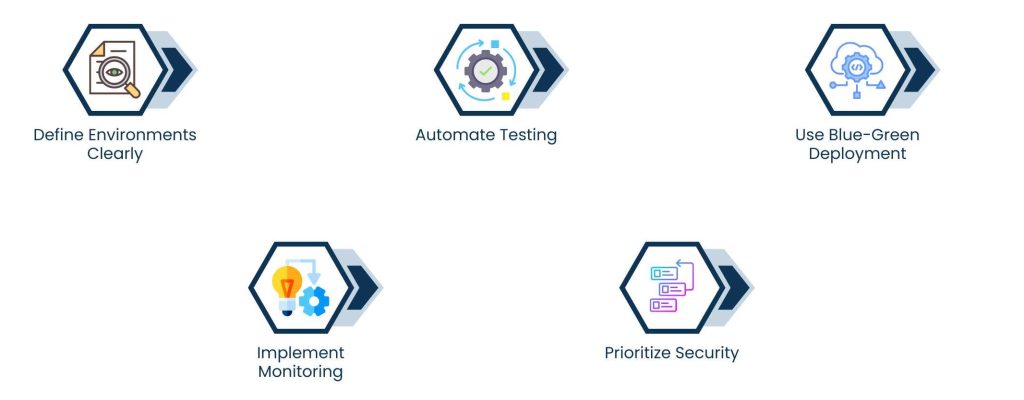Introduction
In today’s fast-paced digital world, delivering software efficiently and securely is a competitive advantage. This is where an Application Deployment Tool becomes invaluable. It helps developers automate the process of releasing, configuring, and managing applications — ensuring smooth delivery from development to production.
Whether it’s a mobile app or a large enterprise system, manual deployment often leads to inconsistencies, downtime, and errors. Deployment tools eliminate these issues by streamlining workflows, maintaining version control, and supporting continuous delivery.
At Tasks Expert, our IT specialists and DevOps Virtual Assistants use advanced deployment tools to help businesses scale faster. They integrate automation, monitoring, and rollback capabilities for zero-downtime deployment and improved user experiences.
Let’s explore how deployment tools revolutionize application management and why they’ve become the foundation of modern software operations.
Understanding the Role of Application Deployment Tools
An Application Deployment Tool is designed to automate the software release process. It ensures that code moves smoothly from development to production without errors or inconsistencies.

Key Responsibilities Include:
- Automation of Deployment Tasks: Eliminating manual configuration to reduce risks.
- Environment Consistency: Maintaining identical setups across staging, testing, and production.
- Version Control: Tracking code changes and rolling back when issues arise.
- Integration with CI/CD Pipelines: Enabling continuous integration and delivery workflows.
- Scalability: Supporting multiple servers and environments without disruption.
For example, pairing your deployment system with IT Maintenance Services ensures round-the-clock monitoring, system health checks, and automated recovery solutions.
The result? Faster delivery cycles, reduced downtime, and consistent user experiences across platforms.
Also Read: Remote Operations Virtual Assistant
Why Businesses Need Application Deployment Automation
In manual deployment, a single missed command or misconfigured environment can cause hours of downtime. Application Deployment Tools eliminate this risk through automation and control.

Key Advantages:
- Speed: Rapidly deploy updates or patches without interrupting service.
- Accuracy: Eliminate configuration drift across environments.
- Reduced Human Error: Scripts replace manual tasks, minimizing failure risks.
- Collaboration: Developers, testers, and IT teams can work within a unified workflow.
- Rollback Options: Instantly revert to stable versions when deployment issues occur.
Businesses that combine deployment automation with Cloud Strategy Engineering Services gain even greater flexibility — scaling applications dynamically without performance compromise.
Automation transforms software delivery from a bottleneck into a strength — turning complex releases into routine operations.
Top Application Deployment Tools in 2025
Choosing the right deployment tool depends on your tech stack, infrastructure, and automation needs.

Here are the leading tools making an impact in 2025:
1. Jenkins
- Open-source automation server for CI/CD pipelines.
- Supports extensive plugins for flexible integrations.
- Ideal for scalable, customizable workflows.
- Open-source automation server for CI/CD pipelines.
2. GitLab CI/CD
- Built-in CI/CD with Git repositories.
- Enables version control, testing, and deployment in one platform.
- Supports containerized and cloud-native applications.
- Built-in CI/CD with Git repositories.
3. AWS CodeDeploy
- Fully managed deployment service by Amazon.
- Automates updates to EC2, on-premise servers, and Lambda functions.
- Ensures zero-downtime rollouts and easy rollbacks.
- Fully managed deployment service by Amazon.
4. Octopus Deploy
- Simplifies multi-environment deployments.
- Offers built-in rollback and release management features.
- Designed for large-scale enterprise deployments.
- Simplifies multi-environment deployments.
5. Azure DevOps
- Comprehensive Microsoft solution for CI/CD and source control.
- Automates build, test, and deployment pipelines.
- Supports hybrid and multi-cloud environments.
- Comprehensive Microsoft solution for CI/CD and source control.
When paired with Software Development Virtual Assistants, these tools streamline deployment cycles — ensuring consistency, quality, and peak performance.
Also Read: B2B Digital Marketing Services
Integrating Deployment Tools into DevOps Pipelines
Deployment tools work best when integrated into your DevOps ecosystem. They connect directly with source control, testing, and monitoring systems to deliver continuous deployment and feedback.

Integration Workflow:
- Code Commit: Developers push changes to repositories like GitHub or GitLab.
- Build Automation: CI tools compile and test the code automatically.
- Deployment Automation: Tools like Jenkins or CodeDeploy release updates to live environments.
- Monitoring: Real-time dashboards track uptime, latency, and user feedback.
- Rollback Mechanisms: Any detected issue triggers automatic version restoration.
By collaborating with Data Management Assistants, DevOps teams can ensure accurate deployment analytics, error tracking, and version mapping for smarter post-deployment optimization.
Integrated pipelines not only enhance software reliability but also shorten development cycles — helping businesses deliver updates at the speed of innovation.
Building a Reliable Deployment Strategy
A successful deployment isn’t just about tools — it’s about strategy. The right setup ensures minimal downtime, seamless user experiences, and robust recovery systems.

Best Practices Include:
- Define Environments Clearly: Separate development, testing, and production stages.
- Automate Testing: Integrate pre-deployment checks to ensure code readiness.
- Use Blue-Green Deployment: Maintain parallel environments for risk-free releases.
- Implement Monitoring: Detect and fix deployment errors in real time.
- Prioritize Security: Validate permissions and credentials before every release.
Working with Technical SEO Consultants helps ensure that application updates don’t unintentionally impact web performance or indexing.
A strong deployment strategy combines technology, process, and foresight — ensuring every release enhances stability rather than creating risk.
Conclusion
As businesses increasingly rely on digital solutions, smooth and reliable software delivery is non-negotiable. An Application Deployment Tool transforms this process by bringing automation, accuracy, and scalability into every release.
From reducing downtime to improving collaboration, these tools redefine how teams handle deployment cycles. They eliminate repetitive manual work and ensure each update is delivered quickly, securely, and consistently.
At Tasks Expert, our technology specialists help businesses integrate and manage deployment automation that fits their workflow. Whether you operate in cloud, hybrid, or on-premise environments, our experts ensure your application lifecycle runs seamlessly from build to release.
In the age of DevOps and continuous delivery, automation isn’t optional — it’s essential.
Frequently Asked Questions
It’s a software solution that automates the release, configuration, and delivery of applications to servers or cloud environments.
Automation reduces manual errors, speeds up delivery, and ensures consistency across environments.
Popular tools include Jenkins, AWS CodeDeploy, GitLab CI/CD, Azure DevOps, and Octopus Deploy.
They integrate with CI/CD pipelines, connecting code, testing, and production for continuous delivery.
Yes, Tasks Expert’s virtual DevOps assistants help businesses set up, monitor, and optimize deployment systems for efficiency and uptime.
About Us
Tasks Expert offers top-tier virtual assistant services from highly skilled professionals based in India. Our VAs handle a wide range of tasks, from part time personal assistant to specialized services like remote it support services, professional bookkeeping service etc. Furthermore, it helps businesses worldwide streamline operations and boost productivity.
Ready to elevate your business? Book a Call and let Tasks Expert take care of the rest.









